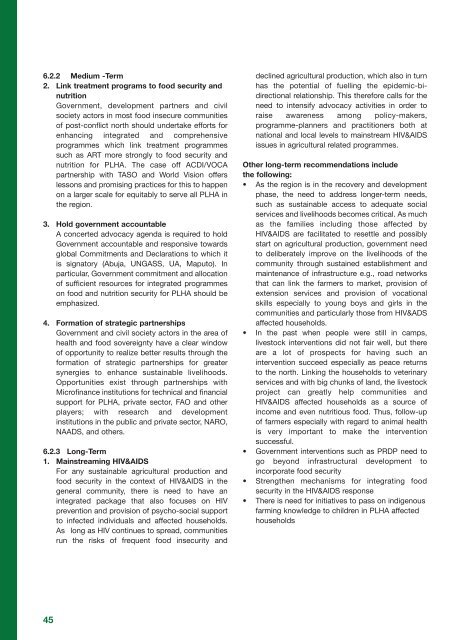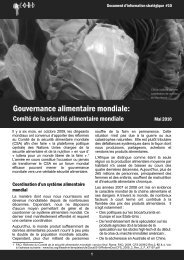Uganda Report 2012 FINAL PO:Layout 1 - ACORD
Uganda Report 2012 FINAL PO:Layout 1 - ACORD
Uganda Report 2012 FINAL PO:Layout 1 - ACORD
You also want an ePaper? Increase the reach of your titles
YUMPU automatically turns print PDFs into web optimized ePapers that Google loves.
6.2.2 Medium -Term<br />
2. Link treatment programs to food security and<br />
nutrition<br />
Government, development partners and civil<br />
society actors in most food insecure communities<br />
of post-conflict north should undertake efforts for<br />
enhancing integrated and comprehensive<br />
programmes which link treatment programmes<br />
such as ART more strongly to food security and<br />
nutrition for PLHA. The case off ACDI/VOCA<br />
partnership with TASO and World Vision offers<br />
lessons and promising practices for this to happen<br />
on a larger scale for equitably to serve all PLHA in<br />
the region.<br />
3. Hold government accountable<br />
A concerted advocacy agenda is required to hold<br />
Government accountable and responsive towards<br />
global Commitments and Declarations to which it<br />
is signatory (Abuja, UNGASS, UA, Maputo). In<br />
particular, Government commitment and allocation<br />
of sufficient resources for integrated programmes<br />
on food and nutrition security for PLHA should be<br />
emphasized.<br />
4. Formation of strategic partnerships<br />
Government and civil society actors in the area of<br />
health and food sovereignty have a clear window<br />
of opportunity to realize better results through the<br />
formation of strategic partnerships for greater<br />
synergies to enhance sustainable livelihoods.<br />
Opportunities exist through partnerships with<br />
Microfinance institutions for technical and financial<br />
support for PLHA, private sector, FAO and other<br />
players; with research and development<br />
institutions in the public and private sector, NARO,<br />
NAADS, and others.<br />
6.2.3 Long-Term<br />
1. Mainstreaming HIV&AIDS<br />
For any sustainable agricultural production and<br />
food security in the context of HIV&AIDS in the<br />
general community, there is need to have an<br />
integrated package that also focuses on HIV<br />
prevention and provision of psycho-social support<br />
to infected individuals and affected households.<br />
As long as HIV continues to spread, communities<br />
run the risks of frequent food insecurity and<br />
declined agricultural production, which also in turn<br />
has the potential of fuelling the epidemic-bidirectional<br />
relationship. This therefore calls for the<br />
need to intensify advocacy activities in order to<br />
raise awareness among policy-makers,<br />
programme-planners and practitioners both at<br />
national and local levels to mainstream HIV&AIDS<br />
issues in agricultural related programmes.<br />
Other long-term recommendations include<br />
the following:<br />
• As the region is in the recovery and development<br />
phase, the need to address longer-term needs,<br />
such as sustainable access to adequate social<br />
services and livelihoods becomes critical. As much<br />
as the families including those affected by<br />
HIV&AIDS are facilitated to resettle and possibly<br />
start on agricultural production, government need<br />
to deliberately improve on the livelihoods of the<br />
community through sustained establishment and<br />
maintenance of infrastructure e.g., road networks<br />
that can link the farmers to market, provision of<br />
extension services and provision of vocational<br />
skills especially to young boys and girls in the<br />
communities and particularly those from HIV&ADS<br />
affected households.<br />
• In the past when people were still in camps,<br />
livestock interventions did not fair well, but there<br />
are a lot of prospects for having such an<br />
intervention succeed especially as peace returns<br />
to the north. Linking the households to veterinary<br />
services and with big chunks of land, the livestock<br />
project can greatly help communities and<br />
HIV&AIDS affected households as a source of<br />
income and even nutritious food. Thus, follow-up<br />
of farmers especially with regard to animal health<br />
is very important to make the intervention<br />
successful.<br />
• Government interventions such as PRDP need to<br />
go beyond infrastructural development to<br />
incorporate food security<br />
• Strengthen mechanisms for integrating food<br />
security in the HIV&AIDS response<br />
• There is need for initiatives to pass on indigenous<br />
farming knowledge to children in PLHA affected<br />
households<br />
45





